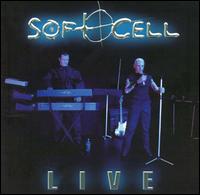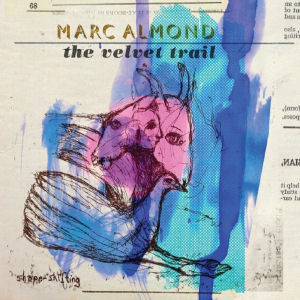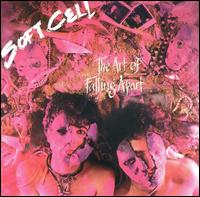
Soft Cell are an English synthpop duo who came to prominence in the early 1980s. The duo consists of vocalist Marc Almond and instrumentalist David Ball. The band are primarily known for their 1981 hit version of "Tainted Love" and their platinum-selling debut album Non-Stop Erotic Cabaret.

Peter Mark Sinclair "Marc" Almond, is an English singer. Almond first began performing and recording in the synthpop/new wave duo Soft Cell where he became known for his distinctive soulful voice and androgynous image. He has also had a diverse career as a solo artist. His collaborations include a duet with Gene Pitney on the 1989 UK number one single "Something's Gotten Hold of My Heart". Almond's career spanning over four decades has enjoyed critical and commercial acclaim, and he has sold over 30 million records worldwide. He spent a month in a coma after a near-fatal motorcycle accident in 2004 and later became a patron of the brain trauma charity Headway.

David James Ball is an English producer and electronic musician, who has played in bands such as Soft Cell and The Grid, and collaborated with other producers including Ingo Vauk and Chris Braide. He is usually called Dave Ball on record sleeves.

"Tainted Love" is a song composed by Ed Cobb, formerly of American group the Four Preps, which was originally recorded by Gloria Jones in 1964. It attained worldwide fame after being covered and reworked by British synthpop duo Soft Cell in 1981 and has since been covered by numerous groups and artists.

This Last Night in Sodom is the third full-length album by the English synth-pop duo Soft Cell. It was released in March 1984, about a month after the duo publicly announced they were dissolving the partnership. The album peaked at number 12 in the UK Album Chart, and would be Soft Cell's last album for 18 years.

Non-Stop Erotic Cabaret is the debut studio album by English synth-pop duo Soft Cell, released on 27 November 1981 by Some Bizzare Records. The album's critical and commercial success was bolstered by the success of its lead single, a cover version of Gloria Jones's song "Tainted Love", which topped the charts worldwide and became the best-selling British single of 1981. In the United States—as a result of the single's success, the album had reported advance orders of more than 200,000 copies. The album spawned two additional top-five singles in the UK: "Bedsitter" and "Say Hello, Wave Goodbye".

Non Stop Ecstatic Dancing is a 'mini' or 'remix' album by English synth-pop duo Soft Cell, released in the United Kingdom in June 1982, by Some Bizzare Records. In addition to remixes of the group's older material, it included a brand-new track, a cover of Judy Street's 1966 song "What", which reached number three on the UK Singles Chart. In some territories the album was released as an EP.

Live is a live album by Soft Cell. The album was released on 7 October 2003 and was recorded throughout Spring 2003 in Birmingham, Manchester, Leeds, London and Brussels during the group's tour in support of the album Cruelty Without Beauty.

The Singles was the first compilation album to be released by Soft Cell. The album was issued on vinyl, cassette and CD in 1986 and features all their singles, from the albums Non-Stop Erotic Cabaret, Non-Stop Ecstatic Dancing, The Art of Falling Apart and This Last Night in Sodom, with the exception of 'A Man Can Get Lost' & 'Barriers'. The CD booklet included a November 1986 essay by Tony Mitchell.

Memorabilia – The Singles is a compilation album of songs by the British singer/songwriter Marc Almond, both as a solo artist and with his partner Dave Ball as the synthpop duo Soft Cell. It was released in 1991 and reached number eight in the UK Albums Chart. The album was promoted by the singles "Say Hello, Wave Goodbye '91" and "Tainted Love '91".

Say Hello to Soft Cell is a compilation album by Soft Cell. The album was released in 1996 by Spectrum and collects singles, album tracks and b-sides. It is also notable for the inclusion of A Man Can Get Lost, formerly previously available only on 7" vinyl single and unavailable on CD, until subsequent releases corrected this. The four-page booklet contains a brief biography by Marc Almond.

The Very Best of Soft Cell is a greatest hits album by English synth-pop duo Soft Cell. It was released on 16 April 2002 by Mercury Records, Universal Music TV and Some Bizzare Records. The album includes most of the duo's singles, as well as B-sides, such as "Insecure Me" and "It's a Mug's Game". The song "Numbers" was considerably shortened for this release, while its AA side "Barriers" was omitted. Two new songs, "Somebody, Somewhere, Sometime" and "Divided Soul", and two brand-new remixes of "Tainted Love" and "Say Hello, Wave Goodbye" were also included. The album reached number 37 on the UK Albums Chart.

"Say Hello, Wave Goodbye" is a song from the album Non-Stop Erotic Cabaret by English synth-pop duo Soft Cell that was released as a single in January 1982 and reached number three on the UK Singles Chart.
This is the discography of Soft Cell, a British synthpop duo consisting of Marc Almond and Dave Ball who rose to prominence in the early 1980s. The duo broke up in 1984 after releasing four albums, but reunited in the early 2000s for a series of live dates and released an album of new material in 2002. The group reunited again in 2018 for a final farewell concert, accompanied by a host of musical and video releases, including a career-spanning box set and a single.
The following list details the discography of the British independent record label, Some Bizzare Records. The label is notable for hosting such artists as Soft Cell, The The and Marc Almond. The discography is broken down into different media type sections.

Tenement Symphony is the seventh studio album by English singer-songwriter Marc Almond. It was released in October 1991 and reached number 39 on the UK Albums Chart. Tenement Symphony includes three UK top 40 hit singles; "Jacky", "My Hand Over My Heart" and "The Days of Pearly Spencer".
"Torch" is a song by English synthpop duo Soft Cell. It was released as a single in 1982, and in mid-June peaked at number two on the UK Singles Chart, ranking 45 for the year. It also reached number 31 on the Hot Dance Club Play chart, number 12 in the Netherlands and number 6 in the Flemish Ultratop 50

The Velvet Trail is the twentieth solo studio album by the British singer/songwriter Marc Almond. It was released by Strike Force Entertainment / Cherry Red Records on 9 March 2015.

Untitled is the first studio album by the British singer/songwriter Marc Almond's band Marc and the Mambas. It was released by Some Bizzare in September 1982.
"What" is a song and single written by H. B. Barnum, performed by Melinda Marx and released in 1965. Marx, daughter of Groucho Marx was a reluctant pop singer and the high notes on "What" found her straining. She recorded only one further single before leaving musical performing which had been foist upon her by her father.
















